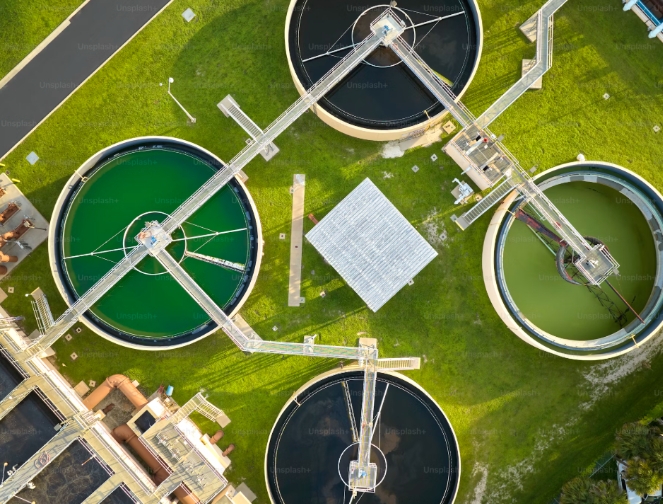
With growing global emphasis on environmental protection, green production has become a key trend for industries to enhance competitiveness. Companies must maintain efficient production while reducing pollution and improving resource utilization.
Innovations and Applications in Water Treatment Technology:
1. Efficient Wastewater Treatment
Modern wastewater treatment technologies not only need to meet discharge standards but also reduce energy consumption and improve water resource recovery rates.
Blowers and Aeration Diffusers provide oxygen during biological treatment, promoting microbial decomposition of organic matter. High-efficiency aeration technology reduces energy consumption and enhances wastewater treatment performance.
MBR Systems (Membrane Bioreactors): Combining biological treatment with membrane separation, these systems effectively remove pollutants while providing high-quality reclaimed water, suitable for industries such as electronics and pharmaceuticals.
DAF Systems (Dissolved Air Flotation): Used in the pretreatment stage to remove oils, suspended solids, and other contaminants, reducing the burden on subsequent treatment processes. This system is particularly beneficial for food processing and chemical industries.
2. Advanced Sludge Treatment
The sludge generated from wastewater treatment requires further processing to reduce volume and recover useful resources.
Dewatering Equipment such as screw presses, plate-and-frame filter presses, and belt filter presses efficiently dehydrate sludge, lowering processing costs.
Sludge Pumps ensure smooth sludge transportation, enhancing overall treatment efficiency.
3. Industrial Water Recycling and Purification
Water scarcity drives businesses to adopt water recycling technologies to lower production costs and reduce environmental impact.
RO Pure Water Systems (Reverse Osmosis): Effectively removes dissolved salts and contaminants from water, providing high-quality recycled water.
EDI Ultrapure Water Systems: Produces extremely high-purity water, essential for high-end manufacturing industries such as semiconductors and pharmaceuticals.
GFS (Glass-Fused-to-Steel) Tanks: Ideal for storing treated pure water or wastewater, offering corrosion resistance and easy maintenance, ensuring system stability.
Innovations in Air Pollution Control Technology:
1. Energy-Efficient Aeration and Air Pollution Control Equipment
Exhaust Gas Recovery and Filtration Technologies: Volatile organic compounds (VOCs) and dust generated during industrial production can be filtered using wet scrubbers and activated carbon adsorption to reduce air pollution.
2. Smart Monitoring and Emission Management
pH/ORP Controllers continuously monitor wastewater and exhaust gas treatment systems, automatically adjusting pH levels and oxidation-reduction potential to ensure compliance and optimize chemical usage.
IoT Technology and Automated Monitoring Systems enhance environmental management efficiency throughout the production process.
By adopting advanced water treatment and air pollution control technologies, businesses can not only reduce energy costs but also lower maintenance expenses, ultimately enhancing long-term competitiveness. Companies that embrace green production technologies will gain more market opportunities, attract environmentally conscious consumers and partners, and strengthen their brand image and market competitiveness.
#Thailand Equipment Purchase


